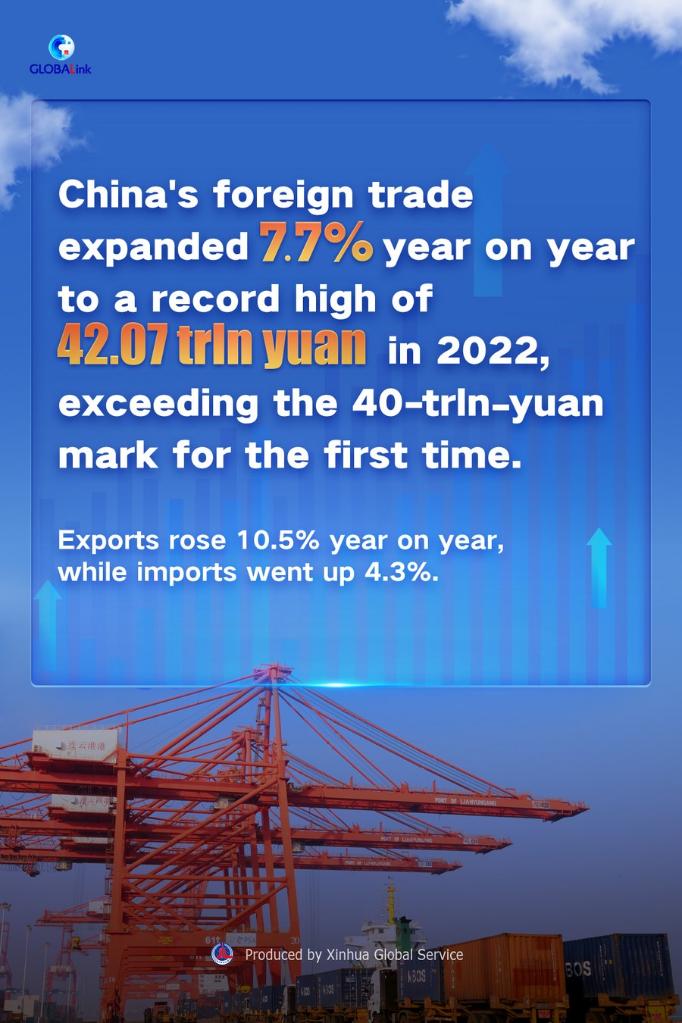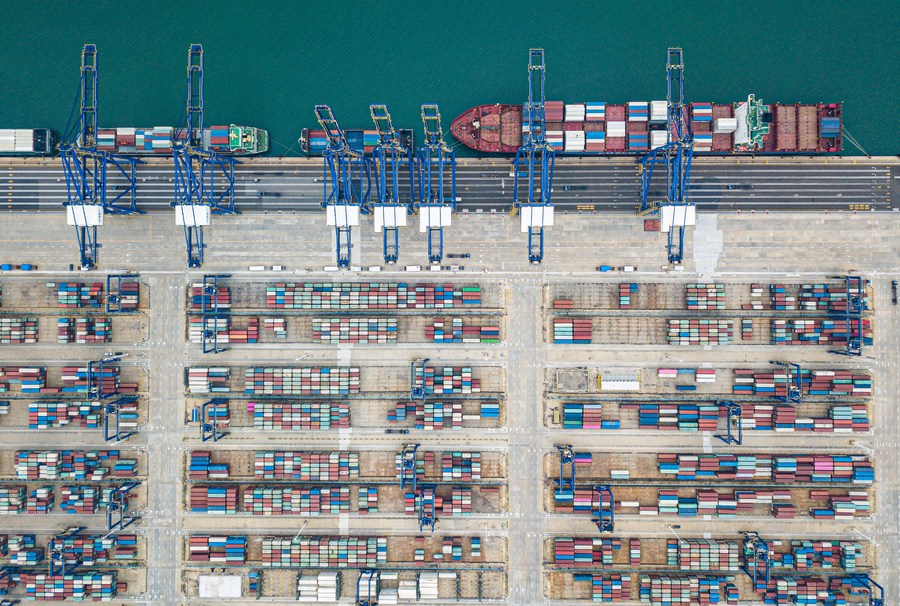China's foreign trade hits record high in challenging year
* China's annual foreign trade value hit record high again in 2022, as the country works to better coordinate epidemic response with economic and social development amid complex and severe domestic and international situations, official data showed Friday.
* Total goods trade reached 42.07 trillion yuan, up 7.7 percent year on year, topping the world for six consecutive years, according to the General Administration of Customs (GAC). The figure exceeded 40 trillion yuan for the first time, said the GAC.
* Going into 2023, officials and analysts said that China should be watchful of cooling global demand amid recession fears and the yet-to-be-consolidated domestic recovery.
BEIJING -- China's annual foreign trade value hit record high again in 2022, as the country works to better coordinate epidemic response with economic and social development amid complex and severe domestic and international situations, official data showed Friday.
Total goods trade reached 42.07 trillion yuan, up 7.7 percent year on year, topping the world for six consecutive years, according to the General Administration of Customs (GAC). The figure exceeded 40 trillion yuan for the first time, said the GAC.
In U.S. dollar terms, the trade value increased 4.4 percent over the previous year to 6.31 trillion dollars, GAC data showed.
Exports rose 10.5 percent to 23.97 trillion yuan, and imports went up 4.3 percent to 18.1 trillion yuan.

China's foreign trade delivered breakthroughs in scale, quality, and efficiency last year, which is a hard-won feat considering headwinds in demand, supply, and expectations, GAC spokesperson Lyu Daliang said.
In 2022, China rolled out policies dynamically to bolster growth, including that of foreign trade.
The package of policies and their follow-up measures to shore up economic recovery have paid off, unleashing the vitality of trade entities, said Lyu.
Foreign trade by private firms jumped 12.9 percent to account for 50.9 percent of the total, crossing the 50 percent mark for the first time, GAC data showed.
Private companies are flexible and adaptable, said Zhuang Rui, a professor at the University of International Business and Economics. They have put these advantages to good use to expand markets and upgrade businesses to guard against lukewarm external demand and exchange rate fluctuations, Zhuang said.
China's vast export market and competitive edge in manufacturing also contributed to the trade growth, said Lyu. The country takes up 14.7 percent of the global export market, leading the world for 14 consecutive years, Friday's data showed.
The country's imports and exports with ASEAN, the European Union, and the United States gained 15 percent, 5.6 percent, and 3.7 percent, respectively. Trade with Belt and Road countries climbed 19.4 percent to account for 32.9 percent of its total foreign trade, while trade with other members of the Regional Comprehensive Economic Partnership (RCEP) rose 7.5 percent.

A heavy truck is assembled on the production line at the Shaanxi Automobile Holding Group Co., Ltd. in Xi'an, northwest China's Shaanxi Province, Sept. 27, 2022. [Xinhua/Liu Xiao]
New drivers are taking hold, as China saw over 60 percent export hikes in green products, including solar batteries, lithium-ion batteries, and electric vehicles, Lyu said.
Import as a whole was underpinned by steady overall growth, Lyu said. In the January-November period, China recorded expansion in fixed-asset investment, industrial output, and online retail sales, among others, official data showed.
China's foreign trade has exhibited notable resilience in recent years due to an ever-improving trade structure, supply chain strengths and targeted policy support, and has contributed to overall growth, analysts have said.
Going into 2023, officials and analysts said that China should be watchful of cooling global demand amid recession fears and the yet-to-be-consolidated domestic recovery.
The World Bank on Tuesday downgraded its 2023 global economic growth forecast to 1.7 percent, the third-weakest pace in nearly three decades. It said the global trade volume will grow 1.6 percent this year, down 2.7 percentage points from its projections last June.
A December report by the United Nations Conference on Trade and Development estimated global trade in 2022 at a record 32 trillion U.S. dollars. However, a slowdown that began in the second half of last year is expected to worsen in 2023 as geopolitical tensions and tight financial conditions persist, it cautioned.

This aerial photo taken on Nov. 5, 2022 shows a view of the Yangpu international container terminal in the Yangpu Economic Development Zone, south China's Hainan Province. [Xinhua/Pu Xiaoxu]
"While we acknowledge potential challenges, we should also see that China's economy is likely to rebound this year, and we should strengthen confidence to further bolster foreign trade," Lyu said.
China has recently optimized its COVID response to enable quarantine-free global travel and ease other curbs, offering a boost to foreign trade firms whose new orders were once disrupted by dampening global demand.
Multiple highlights are expected in 2023 in terms of China's trade structure, said Lian Ping, chief economist at the Zhixin Investment Research Institute. Exports of integrated circuits and auto parts, among other goods, could rise with low-tariff arrangements under the RCEP, and new energy products could also see boosted exports amid global carbon-neutrality commitments, Lian said.
China has pledged improved efforts to maintain the stability of foreign trade, upgrade its trade structure, and develop new international economic and trade cooperation fronts in 2023, according to the tone-setting annual Central Economic Work Conference last December.
Video reporters: Yu Jiaming, Mu Xuyao, Lin Lin, Zhu Jianhui
























